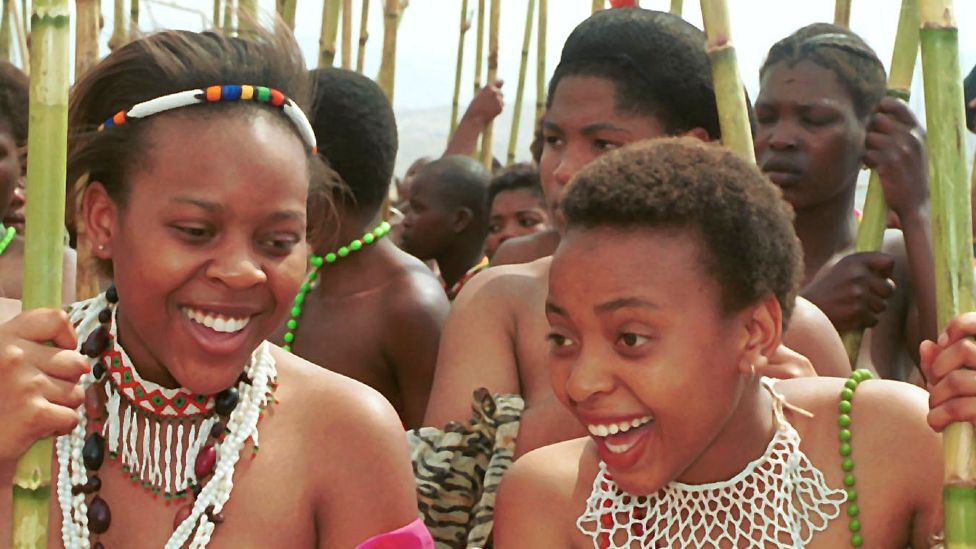Zulu coronation: South Africa’s love affair with King Misuzulu
South Africans are not massive fans of royalty, but the forthcoming official coronation of the new Zulu king has the nation transfixed – and is a watershed moment in its history.
The event will mark a lot of firsts for the country.
King Misuzulu ka Zwelithini, 49, will be formally acknowledged as monarch by President Cyril Ramaphosa – the first time a black president has been involved in a Zulu coronation.
It will be the first Zulu coronation since South Africa became a democracy in 1994. It will also finally put an end to the fierce family feud that dogged his succession to the throne – an embarrassing battle played out in public.
The last coronation took place on a rainy day back in 1971 under the apartheid government, when King Goodwill Zwelithini ka Bhekuzulu was crowned.
Then, as now, South Africa’s traditional leadership was regulated by government. But the white-minority authorities at the time expected the young monarch to wear Western attire.
He attended the event in a suit – a leopard skin sash the only nod to Zulu couture.
As the crowds gather at the Mabhida Stadium in the coastal city of Durban on Saturday for his son’s government-backed coronation, they will be hoping for a more ostentatious display of Zulu culture when President Ramaphosa hands over the certificate that endorses Misuzulu as the ninth Zulu king.
“It’s a joyous occasion, the beginning of a new era,” explains Sihawukele Ngubane, a professor of African languages at the University of KwaZulu-Natal and expert on Zulu culture.
“The apartheid-era government bestowed the certificate to the king back then. This time we expect our king to wear his traditional garb because we now live in a democracy and there’s absolutely no obligation for his majesty to wear British-inspired clothing.”
In another first, the coronation is going to be broadcast live on national television.
A fifth of South Africa’s population is Zulu – the country’s largest ethnic group -and its monarchy has a yearly taxpayer-funded budget of more than $3.6 (£3.2m).
It is the money that tends to put South Africans off royalty – given the country has eight monarchs officially recognised by the government, all funded by taxpayers.
Many question the seemingly lavish lives that some of the traditional leaders lead, with luxury cars and large properties.
Saturday’s state coronation comes two months after a traditional one that took place for King Misuzulu at KwaKhangelamankengane Palace in KwaZulu-Natal province – with festivities attended by thousands of people.
Media caption,
Thousands gather for the coronation of the new Zulu king
The Zulu royal household receives one of the biggest budget allocations, though KwaZulu-Natal’s provincial government states that this money is not just spent on the family – it also covers staff salaries, maintenance of palaces and programmes that deal with traditional ceremonies and social cohesion.
Political parties across the divide have welcomed the new king, including the Economic Freedom Fighters, led by controversial politician Julius Malema. The Zulu Inkatha Freedom Party says it has put aside its difference with the governing African National Congress (ANC) ahead of the event.
Only the South African Communist Party seems unhappy, its members plan to picket the event to raise awareness about the political situation in neighbouring Eswatini, as its absolute monarch, King Mswati III, is attending the coronation of King Misuzulu, his nephew.
The media fanfare that followed the succession saga has brought King Misuzulu to the attention of the South African nation – and endeared him to some.
He trended on social media as young South Africans felt they could identify with him, casually teasing him when he fluffed his first speech.
He made it a few months after his father had died and before his official succession had been resolved. It was a powerful appeal to people in KwaZulu-Natal to stop the looting and riots that broke out in July 2021 following the arrest of former President Jacob Zuma, a proud Zulu, for contempt of court.
It was the worst violence the country had witnessed since the end of apartheid, but as he tried to read the speech in Zulu, he struggled and he ended up reading it much more fluently in English.
For Prof Ngubane, it shows that although King Misuzulu may only hold a ceremonial position, he is considered someone that many look up to as a moral authority.
“In Zulu we say: ‘Umlomo ongathethi manga’, which means ‘What the king says goes’.”
And when he oversaw last month’s Reed Dance – a rite of passage ceremony for teenage girls – the monarch spoke out against gender violence in a country that has one of the world’s highest rate of rapes and sexual assaults.
 The Reed Dance is a rite of passage for young Zulu women and teenage girls (
The Reed Dance is a rite of passage for young Zulu women and teenage girls (“Violence against women and children is an embarrassment to our nation. A woman is to be respected and protected. We must do better as men,” he said.
On the side-lines of those rehearsing for the Durban coronation, some young women tell us why the event means so much to their generation.
“We are excited to attend to show him that we are 100% behind him as king,” one of them says.
Who is Misuzulu ka Zwelithini?
- Born on 23 September 1974 in Kwahlabisa
- Educated privately at St Charles College in Pietermaritzburg
- Studied at Jacksonville University in the US, where he lived for several years
- Married to two wives, with three sons



